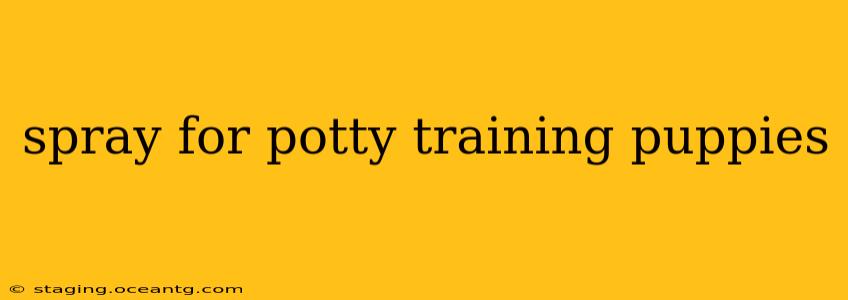Potty training a puppy can be challenging, but with patience and the right tools, it's achievable. While many methods exist, some pet owners explore using sprays to aid in the process. This guide explores the use of sprays for potty training puppies, addressing common questions and concerns. We'll delve into what types of sprays are available, how to use them effectively, and importantly, discuss the ethical and effective approaches to house training your furry friend.
What Kinds of Sprays are Used for Potty Training Puppies?
There are several types of sprays marketed for potty training puppies, but it's crucial to understand their mechanisms and potential effectiveness. Generally, these fall into two categories:
-
Enzyme Cleaners: These are designed to break down the odor-causing components of pet urine and feces. While not directly deterrents, they eliminate the scent that might attract your puppy back to the same spot. The effectiveness of an enzyme cleaner relies on its quality and thorough application.
-
Deterrent Sprays: These often contain scents that puppies find unpleasant, discouraging them from relieving themselves in treated areas. The scents used vary, but the goal is to create a negative association with the location. It's essential to note that the effectiveness of deterrent sprays can vary widely, and some puppies may not be affected by them. Furthermore, overuse or harsh chemicals in these sprays can be harmful to your puppy.
Do Deterrent Sprays Actually Work?
This is a frequently debated topic. While some owners swear by deterrent sprays, their effectiveness is not universally proven. A puppy's response to a deterrent spray depends on several factors, including the puppy's breed, age, personality, and sensitivity to smells. Some puppies might be completely unaffected by the scent, while others might show a mild aversion. It's also worth considering that the spray might only mask the odor, not fully eliminate it, leading to continued accidents in the same area.
What are the Best Practices for Potty Training a Puppy?
While sprays might play a minor supporting role, a successful potty training plan relies heavily on positive reinforcement techniques. These methods are far more effective and humane than relying solely on deterrent sprays:
-
Frequent potty breaks: Puppies have small bladders and need frequent opportunities to eliminate. Take your puppy out frequently, especially after waking up, eating, drinking, and playing.
-
Positive reinforcement: Reward your puppy immediately and enthusiastically when they eliminate outside. Treats, praise, and toys are all effective rewards.
-
Consistency: Consistency is key. Stick to a regular schedule and be patient. Accidents will happen, but don't punish your puppy for them. Instead, focus on rewarding the desired behavior.
-
Crate training (optional): Crate training can help your puppy learn to hold their bladder. Never use the crate as punishment, but rather as a safe and comfortable space for your puppy to rest.
-
Supervision: Supervise your puppy closely, especially when they are indoors. This allows you to quickly identify when they need to go outside.
Are there any Alternatives to Using Sprays?
Yes, there are many humane and effective alternatives to using sprays for potty training. Focusing on positive reinforcement, consistent schedules, and careful supervision will yield better results in the long run. Consider seeking advice from a certified dog trainer or veterinarian for personalized guidance.
Are Deterrent Sprays Safe for Puppies?
The safety of deterrent sprays varies depending on the ingredients. Some sprays contain harsh chemicals that could be harmful to your puppy if ingested or if they come into contact with their sensitive skin. Always choose pet-safe products and follow the instructions carefully. If you have any concerns, consult your veterinarian.
What if My Puppy Still Has Accidents After Using a Spray?
If your puppy continues to have accidents despite using a spray, it's crucial to re-evaluate your potty training approach. The spray likely isn't the primary issue. Focus on positive reinforcement techniques, ensure frequent potty breaks, and consider seeking professional help from a certified dog trainer or veterinarian. They can assess your puppy's behavior and provide tailored guidance.
In conclusion, while some pet owners use sprays as part of their potty training strategy, it's critical to prioritize positive reinforcement and consistent training methods. Sprays, at best, offer a small supplemental benefit. The focus should always be on creating a positive and successful learning experience for your puppy. Remember, patience and consistency are key to successful potty training.
